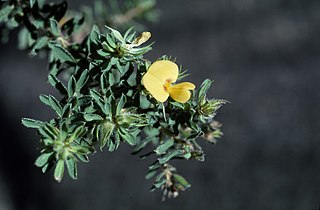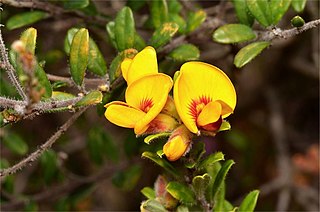
Pultenaea juniperina, commonly known as prickly bush-pea or prickly beauty is a species of flowering plant in the family Fabaceae and is endemic to south-eastern Australia. It is an erect, spiky shrub with hairy stems, linear to narrow elliptic leaves with stipules at the base, and yellow-orange and red flowers.

Pultenaea flexilis known as the graceful bush-pea, is a species of flowering plant in the family Fabaceae and is endemic to eastern Australia. It is an erect shrub with linear to narrow egg-shaped leaves with the narrower end towards the base, and yellow to orange flowers with red markings.
Pultenaea benthamii, commonly known as Bentham's bush-pea, is a species of flowering plant in the family Fabaceae and is endemic to south-eastern continental Australia. It is an erect shrub with sharply-pointed, narrow elliptic to linear leaves and yellow to orange and red flowers in clusters at the ends of branches.

Pultenaea borea is a species of flowering plant in the family Fabaceae and is endemic to Queensland, Australia. It is an erect shrub with elliptic to linear or egg-shaped leaves and yellow to orange and red flowers.
Pultenaea bracteamajor is a species of flowering plant in the family Fabaceae and is endemic to Queensland. It is an erect shrub with cylindrical leaves and yellow to orange and red flowers.
Pultenaea bracteaminor is a species of flowering plant in the family Fabaceae and is endemic to Queensland. It is an erect shrub with cylindrical leaves and yellow to orange and red flowers.

Pultenaea cuneata is a species of flowering plant in the family Fabaceae and is endemic to eastern Australia. It is an erect shrub with triangular to egg-shaped leaves with the narrower end towards the base, and groups of yellow to orange and red to purple flowers.

Pultenaea divaricata is a species of flowering plant in the family Fabaceae and is endemic to a small area of New South Wales. It is an erect shrub with linear, needle-shaped, grooved leaves, and dense clusters of yellow to orange flowers with red markings.
Pultenaea elusa, commonly known as elusive bush-pea, is a species of flowering plant in the family Fabaceae and is endemic to a small area of New South Wales. It is a low shrub with sharply-pointed linear leaves, and dense clusters of yellow to orange and red to purple flowers. It has not been seen since 1938.

Pultenaea linophylla, commonly known as halo bush-pea, is a species of flowering plant in the family Fabaceae and is endemic to south-eastern continental Australia. It is an erect or prostrate shrub with spreading branches, linear to elliptic or wedge-shaped leaves, and yellow to orange and red to purple flowers.

Pultenaea polifolia, commonly known as dusky bush-pea, is a species of flowering plant in the family Fabaceae and is endemic to south-eastern continental Australia. It is an erect to prostrate shrub with linear or elliptic to egg-shaped leaves with the narrower end towards the base, and yellow to orange and red to purple flowers.
Pultenaea robusta is a species of flowering plant in the family Fabaceae and is endemic to eastern Australia. It is an erect shrub with hairy branches, linear leaves, and yellow to orange and red to purple, pea-like flowers.
Pultenaea rodwayi is a species of flowering plant in the family Fabaceae and is endemic to south-eastern New South Wales. It is an erect shrub with hairy branchlets, linear leaves, and yellow to orange and red, pea-like flowers.

Pultenaea rostrata is a species of flowering plant in the family Fabaceae and is endemic to eastern Australia. It is an erect shrub with elliptic to linear, oblong to club-shaped leaves and yellow to orange and reddish-brown, pea-like flowers.

Pultenaea tarik is a species of flowering plant in the family Fabaceae and is endemic to the Gibraltar Range National Park in New South Wales. It is an erect shrub with hairy, arching branchlets, elliptic to egg-shaped leaves with the narrower end towards the base, and yellow to orange and red to purple, pea-like flowers.
Pultenaea tenella, commonly known as delicate bush-pea, is a species of flowering plant in the family Fabaceae and is endemic to the high country near the border between New South Wales and Victoria in south-eastern continental Australia. It is a small, prostrate, mat-forming shrub with elliptic to linear leaves and yellow to orange and red, pea-like flowers.

Pultenaea trifida, commonly known as Kangaroo Island bush-pea, is a species of flowering plant in the family Fabaceae and is endemic to Kangaroo Island in South Australia. It is an erect to prostrate shrub with hairy branches, egg-shaped to more or less round leaves, and relatively few yellow to orange and red, pea-like flowers.
Pultenaea villifera is a species of flowering plant in the family Fabaceae and is endemic to two disjunct areas of Australia. It is an erect to prostrate shrub with triangular to linear, egg-shaped to elliptic leaves and yellow and red, pea-like flowers.

Pultenaea viscidula, commonly known as dark bush-pea, is a species of flowering plant in the family Fabaceae and is endemic to South Australia. It is an erect shrub with branches that are sticky when young, linear to cylindrical, channelled leaves with stipules at the base, and yellow to orange and yellow-red to green flowers.

Pultenaea weindorferi, commonly known as swamp bush-pea, is a species of flowering plant in the family Fabaceae and is endemic to Victoria, Australia. It is a slender, erect shrub with linear to narrow egg-shaped leaves and uniformly yellow, pea-like flowers.












